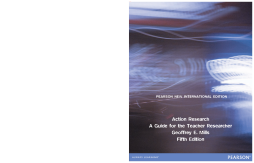
Additional Information
Book Details
Abstract
A main text for courses in action research or a supplement to courses in research methods in education
A step-by-step guide to action research with a balanced coverage of qualitative and quantitative methods. Known for its practical, step-by-step guidance for teachers on how to do research in classrooms, Action Research: a Guide for the Teacher Researcher was born from the author's own experience working with teachers and principals. The author guides future educators through the action research process via numerous concrete illustrations; positioning it as a fundamental component of teaching, alongside curriculum development, assessment, and classroom management.
From reviews of the book:
“Mills’ writing style is informative, direct, and personalized and his expertise as a researcher is evident throughout the textbook. He fully understands the uniqueness of teacher-centered research. . . . The language and the illustration cater to the classroom research contexts and it is easy to understand and apply.”
–Adel Al-Bataineh, Illinois State University
“The book emphasizes the importance of reflection and creating an action plan. . . . Examples of action research papers are included. There are study sites, videos, slides and other supplemental materials available for the students to consult for ancillary learning. The writing style is clear, interesting and engaging. Throughout the text, Mills offers the reader a research scenario that helps to position him or her around the theme of the chapter and context of the research phase. This helps to alleviate some of the anxiety students of action research may experience as they begin each aspect of the action research process.”
–Beverly Melenyzer, California University of Pennsylvania
“[T]he survey examples, SurveyMonkey, and direct observation examples are very good, as well as the informal interview, making records, [and] data collection techniques. . . . [T]he section on re-aligning the focus and action research plan is very good. I find my students doing this as they are doing their literature review and understanding that they need to narrow the scope of their research. I like the example of doing AR in Ch. 6. . . . I like the inclusion of the data analysis, sample interview and other models of how to analyze data. . . . The key strengths of the project are the authentic examples of AR.”
–Mary Frances Agnello, Texas Tech University
